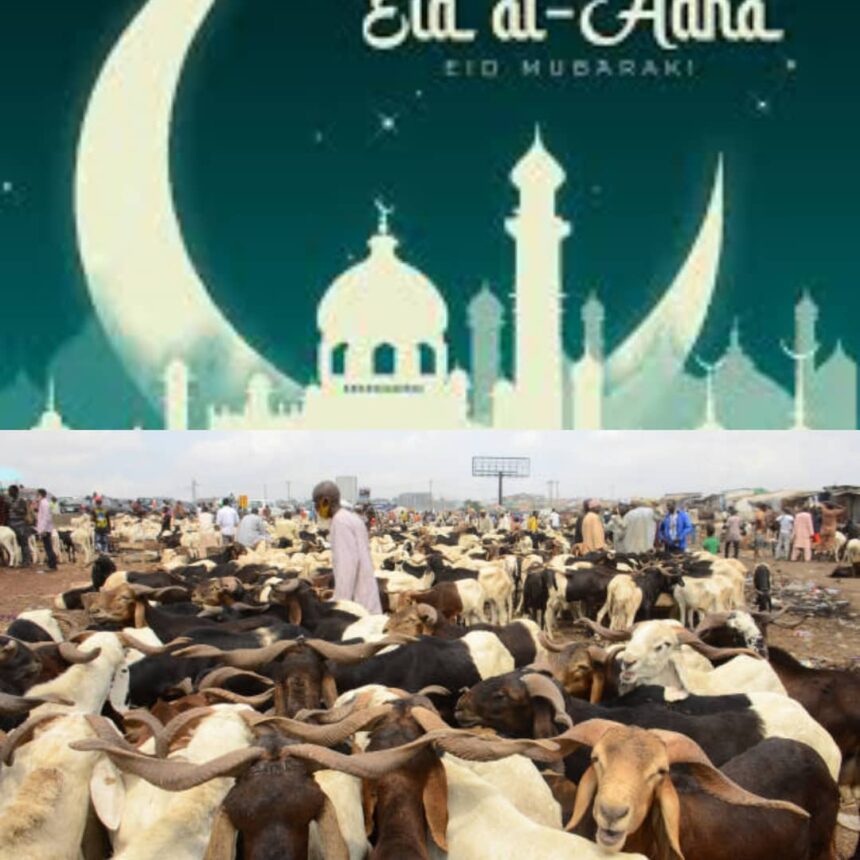The “Eid-ul Adha”also known as “Ileya Festival” or feast of sacrifice is a period of reflection of kindness of Almighty Allah in human life.
It is also a time for Muslims to reminisce and imbibe the virtues of total submission to the Allah’s will, come what may.
During the festivity, families, friends, associates gathered from far and near to rejoice, celebrate the historic festive and glorify Allah for his numerous blessings in a grand style, thereby creating a platform for people to re-unite.
Historically, Ileya festival symbolizes reward for faithfulness, total submission to Allah demonstrated by Prophet Ibrahim who is unarguably the father of faith. These among other attributes of prophet Ibrahim became imperative for man to uphold, particularly the muslim ummah .
The festive is globally celebrated by Muslims the day after Hajj pilgrims descend from mount”Arafat” every year.
One significant thing about “Ileya festival”is the slaughtering and sharing of Rams, which is a form of worship and to ensure happiness for all.
According to Islamic scholars, eligible and capable individuals who offer Rams as sacrifice on the day, is promised abundant rewards equivalent to the hair of the sacrificial animal by the Almighty Allah, with forgiveness of sins committed in the last 365 days, this is a testament to the beauty of the festival and Islam.
How Best should Muslims then celebrate the festival? What are the essential things to be done during the period? Is there a reward for celebrating the festive in accordance with dictates of the Holy Quran? Would there be punishment for anyone who acts in contrary?
First, it is bestowed on every Muslim to prepare for Eid – prayer which is to be observed in congregation at a mosque or designated prayer site. To take a purification bath (Ghusl janaba) ahead of the prayer is also important, and one is expected to put on his or her best clothes, and apply fragrance.
Perform the” Qurbani” “by sacrificing either of the scripturally prescribed animals such as Ram/Sheep, Goat, Cow and Camel or sheep, if you can afford to do so.
The meat should be divided into three portions: a part for yourself and family, some portions for relatives and friends, and the third part for the needy.
Share the meat (Qurbani) with those in need, including the poor, orphans, and neighbors.
Visit family and friends, exchange greetings (Eid Mubarak), and engage in acts of charity.
Exchange gifts,
enjoy special meals,
refrain from unnecessary spending and overindulgence. Say Takbir Tashriq after each of the five daily obligatory prayer.
It is very important to remember the story of prophet Ibrahim,
reflect on the story and his willingness to sacrifice his son, Ishmael (Ishmael) for the sake of God. Remember the significance of Eid al-Adha as a time of remembrance, gratitude, and devotion.
As muslims celebrate the annual festival, it is important to follow the traditions that comes with the festive and focus on acts of piety, charity, connect with loved ones, abstain from oppression of any kind , reach out to those in need , apply the lessons associated with the festive in your daily activities after post Ileya festival , and above all , celebrate in modesty for a fulfilling and rewarding celebrations.
Adedamola Adegoke writes from Ibadan, Oyo State.
